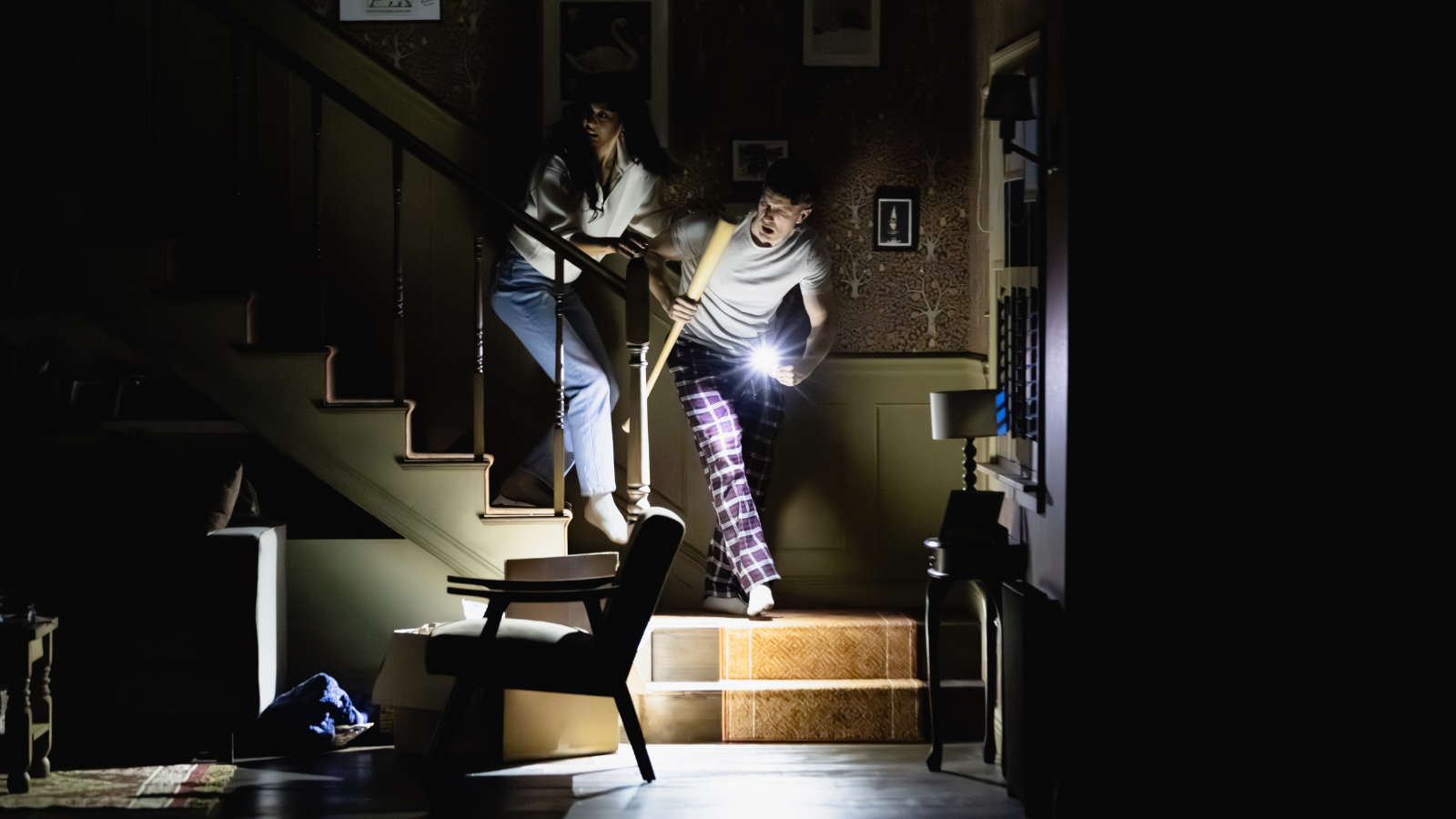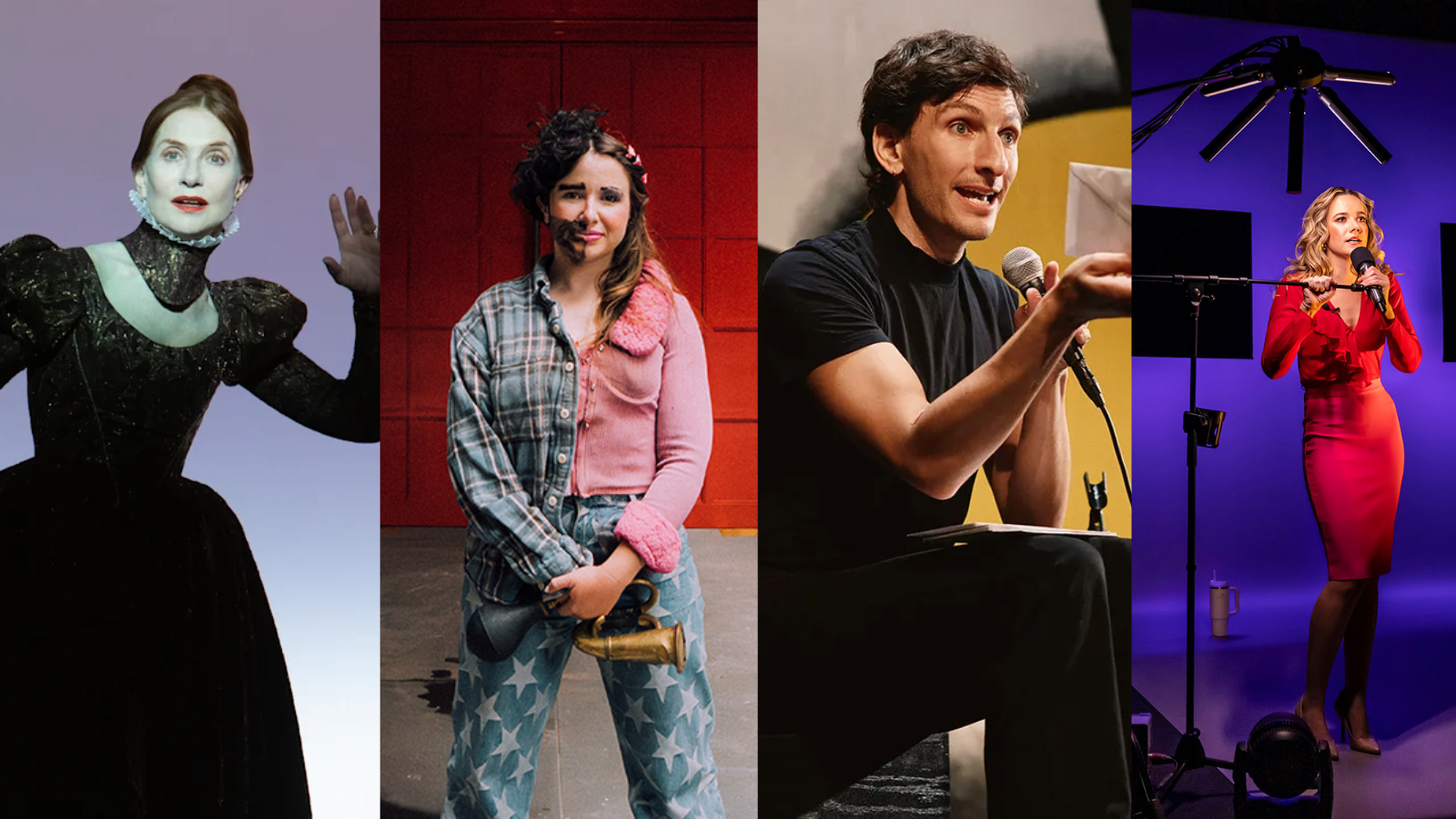.png)
It’s that time of year! Over the past 365 days, the team here at Theatrely has traveled far (Brooklyn) and wide (London) to cover hundreds of productions and as always, Editor-in-Chief Kobi Kassal and Chief Critic Juan A. Ramírez sat down to decide their favorites. From Midtown Manhattan to theatres across the country, there have been many incredible productions during 2025. Here are our favorites:
Broadway:
Juan: Liberation & Marjorie Prime
Kobi: Liberation, Just In Time, Boop! The Musical

Off-Broadway:
Juan: Meet the Cartozians & Practice
Kobi: We Had A World & I’m Assuming You Know David Greenspan

Regional:
Kobi: Paranormal Activity at CTG’s Ahmanson Theatre

London:
Juan: Here We Are at the National Theatre
Cabaret:
Juan: Amber Iman (Joe’s Pub) & Natalie Walker: Mad Scenes (Joe’s Pub)
Kobi: Cat Cohen (Joe’s Pub) & Michelle Collins: Wait Why Don't I Know You (Joe’s Pub)

Solo Show:
Juan: I’m Assuming You Know David Greenspan; Mary Said What She Said; Weather Girl
Kobi: Can I Be Frank? & Weer

Unexpected Fav:
Juan: All the World’s A Stage & Burnt Toast
Kobi: Office Party & Golem Owned A Tropical Smoothie
Best Number:
Juan: “The Call” (Floyd Collins); “Three Bedroom House” (Bat Boy)
Kobi: “Where I Wanna Be” (Boop!) & “Broadway Baby” (Old Friends)
Most Obsessed Moment:
Juan: Nadine Sierra’s victorious high F in La sonnambula (Met); Sierra Boggess explaining why she won’t spare change in Prosperous Fools; The Twist in Slam Frank
Kobi: Winning a mop at Joy: The Musical, A Chorus Line 50th Anniversary, Eating Soup at Slanted Floors
Standout Stars:
Juan: Matt Rodin in All the World’s a Stage and Beau; Orville Peck and Eva Noblezada in Cabaret; Nik Christopher in Chess; David Greenspan and Rachel Crowl in Prince Faggot
Kobi: Jasmine Amy Rogers in Boop!, Louis McCartney in Stranger Things, Jalynn Steele in Mamma Mia!, Quincy Tyler Bernstine Well I’ll Let You Go, Gracie Lawrence in Just in Time, Taylor Trensch in Bat Boy, Rachel Crowl in Prince Faggot, Jen Tullock in Nothing Can Take You Form The Hand Of God, Pete Zias in Messy White Gays, Alana Arenas in Purpose
See you next year!
P.S. - Thanks to all of the wonderful photographers for capturing the magic on stage this year
.png)
Freshly 96, June Squibb is giving one of the sharpest and most emotionally precise performances currently onstage in the Broadway premiere of Marjorie Prime, Jordan Harrison’s one-act about an elderly widow and the lifelike robot modeled after her late husband. Exquisitely directed by Anne Kauffman, and rounded out by Cynthia Nixon, Danny Burstein and Christopher Lowell, it’s an intelligent prayer for raw humanity in the face of catastrophic tech complacency.
The setup is simple, at first feeling like a dramedy about a daughter dealing with her Alzheimer’s-stricken mother’s antics at an assisted-living community. That’d be Tess (Nixon), who’s less than thrilled with her mother Marjorie’s (Squibb) growing attachment to her Prime: a friendly humanoid who can retain information and stand in for a person. Like Tess’ father, it’s named Walter; but unlike how he went out, it’s portrayed at peak physicality to resemble the man in his 30s (Christpher Lowell, in an excellently automated performance). Tess’ husband Jon (Danny Burstein) deems it mostly harmless for Marjorie to have a companion in her later years, even though the Prime grows from whatever possibly flawed information it is fed. For Tess, there’s a gnawing tension in allowing her mother the sweet respite of fond memories when it’s chased by the knowledge that the harder she leans on the built-to-please technology’s coddling, the further from reality she’ll become. The ultimate irony, of course, lies in the “couple’s” generative divergence: as hers decreases, his grows stronger.
I cannot imagine how this played in 2014, when it premiered. Today, with people developing “AI psychosis” from constant interactions with services like ChatGPT, it is almost unbearably grim. Thankfully, that’s where the performances, built gloriously from Harrison’s script, come in.
.png)
Lowell ably fuses the tender warmth for which his character has been created with the icy distance of its reality. Burstein radiates an empathy that grows as his character must navigate murkier emotional realities. Nixon, as always, is extremely skilled at portraying women long backed into a hardened corner – equal parts their own steely volition and as a result of the world’s apathy – but with a bittersweet warmth at this knowledge.
At the center of this, even as the story cleverly shifts focus, is Squibb and her masterfully expressive face. In contrast to her younger costars, the veteran often plays out towards the audience, finding her light somewhere between our hearts and minds; this is someone who understands the art of stage performance. Her organic turns between girlish glee and instantly heartbreaking anguish are genuinely staggering.
Harrison’s drama is equally poignant, not only in its thematic conceit and narrative scope but in its beautiful turns of phrase: “I don’t have to get better. Just keep me from getting worse,” Marjorie begs of her Prime.
The production is equally delicate, with Lee Jellinek’s Palm Springs-style home set pulling off a simple, bravura gesture in the play’s final moments, aided by Ben Stanton’s lighting and Daniel Kluger’s sound design. The clothes which Márion Talán de la Rosa has designed for Squibb are enviably cozy.
That Marjorie Prime doesn’t end in abject misery, even as it inches toward a suggestion of something like the Dead Internet theory, is almost a miracle. Plays hardly come as astutely, or productions as perceptive as this – and rarely anyone as brilliantly as Squibb.
Marjorie Prime is in performance through February 15, 2025 at the Hayes Theatre on West 44th Street in New York City. For tickets and more information, visit here.
.png)
This vampire is back and she is here to Slay. Today, it was announced that the new original musical Blood/Love will make its way Off-Broadway this Spring at Theater 555 beginning Friday, February 13, 2026. Directed by Hunter Bird, this new musical will officially open Tuesday, March 3, 2026 for a limited run through Sunday, March 29, 2026.
Written by Carey Sharpe and Grammy nominee Dru DeCaro, the piece will star Sharpe as Valerie Bloodlove. She’s the world’s first vampire. For a thousand years, she ruled the night. Now, she’s thirsty for more.
Step inside the seductive world of Blood/Love, New York’s new pop opera that transforms the classic vampire tale into an ultra-contemporary theatrical extravaganza. Under the sultry lights of a nightclub, The Crimson, the former queen of the underworld searches for an existence beyond eternal bloodshed. But her endless night changes when she meets a mortal soul with his own devilish secret.
Brought to sumptuous life from one of the creative minds behind Masquerade and two acclaimed choreographers from Dancing with the Stars, this new musical experience intoxicates the senses. With a blood-pumping original score and cinematic spectacle, Blood/Love surrounds you with an atmosphere so decadent, even the undead feel fiercely alive.
Choreography is by Jonathan Platero & Oksana Platero (“Dancing with the Stars,” “So You Think You Can Dance”), and Natalie Malotke with music supervision by Matt Hinkley (The Outsiders) and music direction by Ben Covello. The design team includes set design by Emmy Award winner Jason Ardizzone-West (Jesus Christ Superstar Live), costume design by Alex & Juli Abene, lighting design by five time Tony Award nominee Japhy Weideman (The Heart of Rock n Roll), sound design by Tony Award winner Jessica Paz (Hadestown), projection design by Tony Award winner 59 Studio (Stranger Things: The First Shadow), and prop design by Lauren Page Russell (Our Town). Casting by Peter Dunn & Benton Whitley of Whitley Theatrical. Additional casting will be shared at a later date.
To purchase tickets to Blood/Love, please go to bloodlove.com/tickets












.png)



.gif)








.png)




















%20copy.webp)

























.jpeg)
.png)
.png)


.png)

.png)
.png)

.png)


.png)
.jpeg)
.jpeg)

.png)
.png)





.png)
.png)









.png)








